Post
A catch
Save a catch to start your fishing logbook. You will be able to to share it with the community if yo want!
A fishing trip
Post an ad to go fishing with other fishermen
Save a catch to start your fishing logbook. You will be able to to share it with the community if yo want!
Post an ad to go fishing with other fishermen
Share a thought, a question with the community
My favorite cities
×Join our 2 fishermen in Miami in Miami-Dade. The fishing forecast is currently 3.3. The most caught fishes here are the gulf kingfish, the tripletail fish, the florida pompano and the yellowtail snapper. Come try the most famous fishing techniques like the surf fishing, angling - using floats, support fishing for bass or dive fishing.
Our fishing forecast of Miami indicates the best time to go fishing in this city.
The Gulf Kingfish
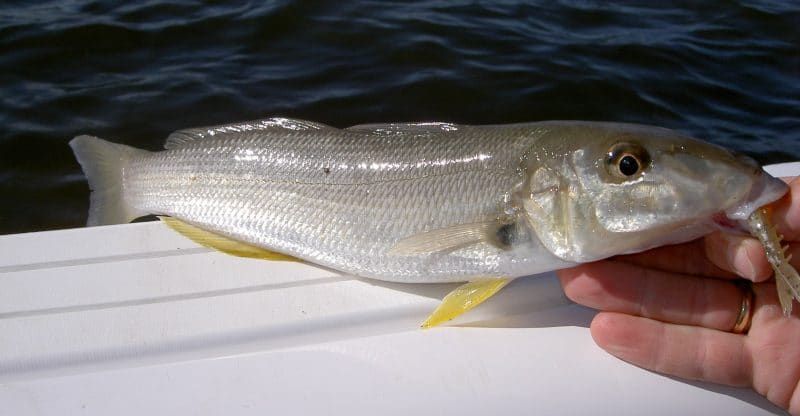
The Gulf Kingfish belongs to the Scianidae family. The adult size can reach 60 cm for 1,36 kg. It has a lifespan of 6 years. It breeds from September to March. It can be fished all year. Also known as a kingcroaker, the Gulf Kingfish is the biggest of the three whiting. The body is silvery in color and does not contain vertical spots or stripes like the other two species. However, it has a very visible black spot on the top of the tail.
The Gulf Kingfish is a famous fish you can catch in Miami.The Tripletail fish
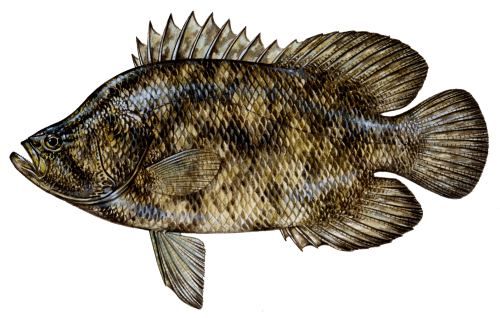
The Tripletail fish belongs to the Lobotidae family. The tripletail is 89 cm long and weighs 18.6 kg. However, the average weight is between 1 and 7 kg. The Tripletail have a lifespan of about 10 years. They spawn in summer. It can be fished all year round. The tripletail has small scales that extend over the dorsal, caudal and anal fins and a head profile that becomes more concave with age. The tripletail has a compressed and deep body, with a triangular head. The eyes are relatively small and the mouth is large. The bases of the dorsal and anal fins are flaked and the pectoral fins are shorter than the pelvic fins. The tripletail has soft, large and rounded dorsal, caudal and anal fins. This characteristic has given rise to the common name. Juveniles are marbled yellow, brown and black. Lying on the side at the surface of the water, a young tripletail looks like a floating mangrove leaf. Juveniles have white pectoral fins and a white border on the caudal fin. The adult tripletails have a variety of marbled patterns, ranging from dark brown to reddish brown or brown with a shade of grey.
The Tripletail fish is a famous fish you can catch in Miami.The Florida Pompano
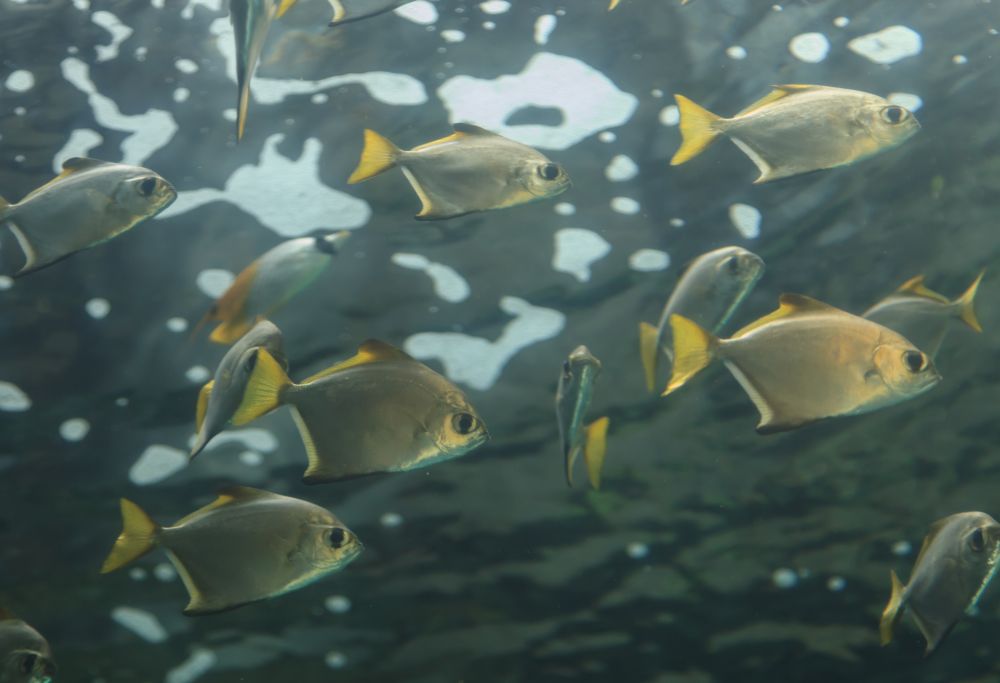
The Florida Pompano belongs to the Carangidae Family. They weigh less than 1.4 kg and are less than 43 cm long, although the largest individuals weigh between 3.6 and 4.1 kg and reach lengths of up to 66 cm. They have an average life span of 4 years. They breed from March to September. They are abundant and can be fished from October to January. Florida Pompano has an extended, oblong and flattened body with similar upper and lower profiles. They are generally silvery and turn ventrally yellow without any distinctive marks. Their fins are yellow except for their dorsal fin, which is dark. Their head has a very rounded and extensible snout. Their mouth reaches the eyes and has small conical teeth that disappear in large fish. Their anal fin has 2 detached spines, followed by a spine and 20 to 24 rays; their caudal fin has a fine base and is deeply forked; their dorsal fin has 6 strong and short spines and 22 to 27 rays; and, their pectoral fins are short. Their anal fin and soft dorsal fin have similar bases with raised but not very elongated frontal lobes. They have 5 to 7 gills on the upper part of the arch and 8 to 14 gills on the lower part of the arch. Their lateral line is straight and has no scutes. Their bodies are covered with oval scales.
The Florida Pompano is a famous fish you can catch in Miami.The Yellowtail snapper
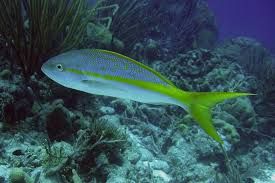
The Yellowtail snapper belongs to the Lutjanidae family. it reaches a maximum length of 85 cm for an average length of 45 cm. The maximum weight recorded is 4.1 kg. He has a life expectancy of 17 years. It can reproduce all year round. It can be fished from mid-June to mid-July. The Yellowtail snapper has an oval body. A bright yellow median band runs from the upper lip to the caudal fin. It is very thin between the lip and the eye, thicker then to widen on the side of the caudal. It divides the sides into two distinct parts. The underside is silvery-white with narrow lines alternating reddish and yellow, sometimes not very visible. The upper part is blue to purple, covered with yellow spots regularly arranged. The dorsal and caudal fins are bright yellow. The caudal is very forked, the upper lobe being longer than the lower lobe. The pectoral, pelvic and anal fins are white. The pectoral muscles are long, ending at the anus level. The head, triangular and relatively small in size compared to the body, shows a slight advance of the lower lip compared to the upper. The mouth is large and has prominent canines.
The Yellowtail snapper is a famous fish you can catch in Miami.The Yellowfin Tuna
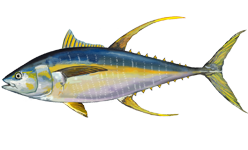
The Yellowfin Tuna belongs to the Scombridae family. The maximum reported length for yellowfin tuna is 280 cm overall length and the maximum weight is 400 kg. It can live for about 7 years. It reproduces all year round. It can be fished all year round. Yellowfin tuna is a large tuna. Its body is strongly tapered and deeper under its first dorsal fin, while decreasing considerably towards the caudal peduncle. Two dorsal fins are present. In adults, the second dorsal fin is very long, as is the anal fin, located directly below the second dorsal fin. These fins become relatively longer in larger individuals. The pectoral fin is also long and extends beyond the space between the dorsal fins. The caudal peduncle is very thin and includes three sets of pins. Seven to ten dorsal and ventral pinnacles are present. Behind the corselet, scales are missing, and a band of big scales encircle the body behind the head. A swim bladder is present. The eyes are small; the teeth are small and conical. The body is dark blue or metallic greenish above, while the belly and lower sides are silvery white with many interrupted vertical lines. Perhaps more clearly, a golden stripe runs along the side. The second dorsal and anal fins and pinnacles are bright yellow, and the pinnacles are bordered by a narrow black band.
The Yellowfin Tuna is a famous fish you can catch in Miami.Our fishing forecast of Miami indicates the best time to go fishing in this city.
Our fishing forecast of Miami indicates the best time to go fishing in this city.
Our fishing forecast of Miami indicates the best time to go fishing in this city.
